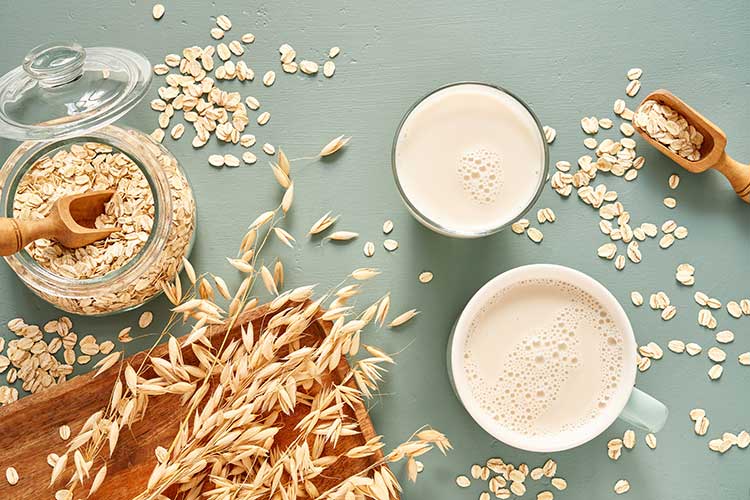The plant-based milk category is no stranger to consumers’ environmental and health concerns. Because of this, the market stirred up the need for more clean label ingredient options. One natural solution includes using Citri-Fi® citrus fiber in oat milk due to it water holding and emulsification benefits. Not only is this citrus fiber created using a process free from chemical modifications, but it also provides product developers clean labeling options.
A popular meme showing a coffee sipper ordering a sugar-free, fat-free, dairy-free and water-free drink is handed a cup of “air” emphasizes consumers’ desire for extreme customization. But this comical anecdote is not too far from the truth. Coffee shops jumped on the customization bandwagon years ago. Today, they personalize each disposable cup with a Customer’s name and fill it with tailored contents. Because of this customization, foods like plant-based milks found a home in the baristas arsenal of coffee condiments. Among these plant-based options emerged oat milk.
The Oat Milk Enthusiasm in Words
Oat milk started its craze in the coffee shop scene. But it was not long before it entered the mainstream beverage world alongside the market leader - almond milk. The oat-based beverage’s sudden appearance created a ripple of curiosity amongst consumers. And with early adoption and newness comes the questions. It was no surprise that Fiberstar’s SEO radar picked up numerous internet inquiries wrapped around this new oat milk phenomena.
Some typical queries included: What is oat milk? Is oat milk sustainable? Is oat milk clean? Many of these questions share an underlying common theme that pertains to consumers environmental and health concerns. However, if one dives deeper, some of the inquiries become highly specific such as: Is oat milk high in fiber? Does oat milk contain beta-glucan? Why is gellan used in oat milk? And one of the more fascinating questions that surfaced was what is citrus fiber in oat milk?
Challenges in Processing Plant-based Milks
Like many plant-based milks, oat milk processing comes with its own set of hurdles. Creating oat milk requires breaking the oat grain apart into pieces and converting it into a smooth drinkable liquid. After processing the oat, the liquid fraction typically contains remaining plant-based materials that tend to settle out during shelf-life in a finished beverage. Because of this, commercial emulsifiers and stabilizers are commonly used to keep the particulates in suspension. One popular stabilizer used in this product type is gellan gum.
Thanks to consumers’ growing conscience, food labeling plays an active role in oat milk’s existence. Though gellan gum is a holy grail ingredient when it comes to functionality, it is being associated with ultra-processed foods. As a result, formulators are searching for clean alternatives. But, what is considered clean label in the oat milk world? This curiosity explains why internet inquiries are revolving around citrus fiber in oat milk.
Compare and Contrast Citrus Fibers
Most citrus fibers are created from byproduct which supports the industry’s upcycling efforts. And they all share the clean labeling options such as citrus fiber, dried citrus pulp or citrus flour. However, not all upcycled citrus fibers are created the same. For instance, many citrus fibers are byproduct of pectin extraction. Typically, these processes use chemical modifications or solvents. And because of these type of processes, the final citrus fiber tends to have limited functionality in food and beverages.
In contrast, there are other citrus fibers that are byproducts of the citrus juicing industry. For example, Citri-Fi citrus fiber is an upcycled food ingredient that uses a process free of chemical modifications. As a result, the fibrous composition stays intact, including the high pectin content, which gives it its high water holding and emulsification power. And when Citri-Fi is exposed to high shear such as homogenization, the fibrous composition adds viscosity which is another key benefit in oat milks.
Citrus Fiber in Oat Milk
Due to the natural water holding and emulsification, oat milk developers are exploring this food ingredient as a clean label option. Citri-Fi citrus fiber, between 0.1% and 1%, can create smooth and stable oat milks without the use of additional food gums like gellan gum. The clean labeling implies dietary fiber which enriches the nutritional profile of plant milks. Citri-Fi is heat and shear stable so that its dual functionality is not only maintained, but depending on the shear effects, enhanced.
In addition to the functional and labeling benefits, Citri-Fi citrus fiber is also available in certified organic. This natural food ingredient has no e-number. And it is non-GMO project certified, allergen-free and gluten-free.
Other Uses of Oats
Besides plant-based milks, the use of oats branched out into other food products including yogurts, frozen desserts, spreads and creamers. The popularity as a coffee creamer stems from its ability to froth easier, mellow out acidic notes and create a rich and creamy mouthfeel. However, some of these same benefits improve the quality of other food and beverage formats. And like citrus fiber in oat milk, Citri-Fi’s water holding and emulsification can improve the stability of yogurts, minimize ice crystallization in frozen desserts and reduce syneresis in spreads.
Now that these plant-based categories welcomed the newcomer, many product developers are creating second generation products focusing on protein enrichment, flavor assortment and sugar reduction. Other trends tilt toward portability and convenience. Regardless, oat milk is here to stay due to its low environmental impact and health benefits which tells a eco-friendly and sustainable story.


